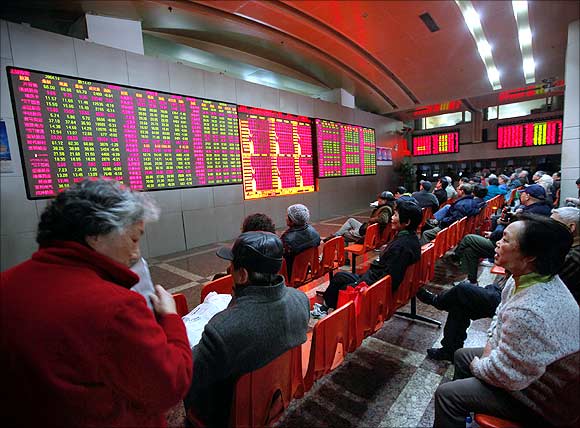
Indian markets under-performed this year, partly given the fact that they had a good run in 2014.
After soaring nearly 155 per cent in a year to 5,166 on June 12, China’s Shanghai Composite index has tanked nearly 22 per cent in only 10 sessions till Monday.
The fall comes on the back of mounting concerns that the year-long bull-run might be coming to an end amid valuation concerns and the possibility of an economic slowdown, which saw China’s central bank cut its benchmark rates by 25 basis points to 4.85 per cent on Saturday, fourth reduction in seven months.
Also taking a toll on the global market sentiment, including the Shanghai Composite, was the possibility of Greece defaulting on payments to creditors.
A four-month extension on the bailout agreement expires on June 30.
Amid this frenzy to invest and ride the bull market, China’s investors opened 4.4 million brokerage accounts in a single week in April.
Analysts at Nomura suggest the reason China A-shares (listed on the Shanghai Composite and the Shenzhen Stock Exchange) outperformed H (listed on Hang Seng) in the fourth quarter of 2014 was because at the grass root level, the average Chinese could see the central leadership was doing the right thing by cracking down on rampant corruption, enforcing better judiciary fairness, and cutting back administration discretion by various central and local government divisions.
However, given the run-up, Morgan Stanley recently lowered its target for the Shanghai Composite citing concerns over increased equity supply; continued weak earnings growth in the context of economic deceleration; high valuations and very high margin debt to free float market capitalisation.

Indian markets
Indian markets under-performed this year, partly given the fact that they had a good run in 2014.
Chinese markets, on the other hand, saw a huge rally because of which there was a shift of money from India to that country.
Can a fall in the Shanghai Composite Index now spread to other Asian and emerging markets or would foreign institutional investment flows, which once deserted India, stage a comeback?
Analysts suggest the chances of a sudden collapse in the Shanghai Composite are remote and will not benefit any EM peer, at least in the immediate term.
Explains Tirthankar Patnaik, India strategist at Japan-based Mizuho Bank: “Chinese markets have had an unprecedented run in 2015 amidst hopes of a soft landing and a gradual recovery in the global economy, a key driver for Chinese exports.
“We believe chances of a sudden incremental collapse in Chinese markets are remote, particularly after the ongoing sell-off, but not zero.”
“However, events since late 2013 tell us that the People's Bank of China and the Chinese government remain in a position to avert a sudden rise in uncertainty, which would be a precursor to a fall.
“India's benefit from capital outflows from China remains contingent on the process being gradual; we believe a sudden drop in Chinese markets is unlikely to be a beneficiary to any emerging market peer,” he adds.
G Chokkalingam, founder and managing director, Equinomics Research & Advisory, feels the fall in Shanghai Composite will not adversely impact the Indian markets.
“Indian markets were highly co-related with the Chinese markets after the Lehman Brothers crisis.
“At that time, the contagion impacted global equities as an asset class.
“This time around, however, Chinese and the Indian markets are not as co-related. “Secondly, there is valuation comfort with the Indian markets compared with Chinese markets that seem over-valued.
“Thirdly, India’s gross domestic product growth is likely to be better than China’s going ahead,” he says.
“All these factors combined, Indian markets should not be impacted much by the fall seen in the Shanghai Composite.
“However, India can attract some incremental FII flows given the developments in China going ahead,” he adds.
Both the images are used for representational purposes only




.jpg)






